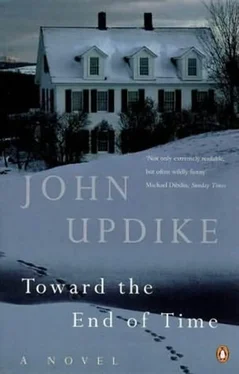John Updike - Toward the End of Time
Здесь есть возможность читать онлайн «John Updike - Toward the End of Time» весь текст электронной книги совершенно бесплатно (целиком полную версию без сокращений). В некоторых случаях можно слушать аудио, скачать через торрент в формате fb2 и присутствует краткое содержание. Жанр: Современная проза, на английском языке. Описание произведения, (предисловие) а так же отзывы посетителей доступны на портале библиотеки ЛибКат.
- Название:Toward the End of Time
- Автор:
- Жанр:
- Год:неизвестен
- ISBN:нет данных
- Рейтинг книги:3 / 5. Голосов: 1
-
Избранное:Добавить в избранное
- Отзывы:
-
Ваша оценка:
- 60
- 1
- 2
- 3
- 4
- 5
Toward the End of Time: краткое содержание, описание и аннотация
Предлагаем к чтению аннотацию, описание, краткое содержание или предисловие (зависит от того, что написал сам автор книги «Toward the End of Time»). Если вы не нашли необходимую информацию о книге — напишите в комментариях, мы постараемся отыскать её.
Toward the End of Time — читать онлайн бесплатно полную книгу (весь текст) целиком
Ниже представлен текст книги, разбитый по страницам. Система сохранения места последней прочитанной страницы, позволяет с удобством читать онлайн бесплатно книгу «Toward the End of Time», без необходимости каждый раз заново искать на чём Вы остановились. Поставьте закладку, и сможете в любой момент перейти на страницу, на которой закончили чтение.
Интервал:
Закладка:
I was indignant to have driven an hour and sacrificed a morning of my dwindling life, but there were grandparents present from Arizona and Florida, shaming me once again with my relative lack of family feeling. My passion to survive had only been partially placated by childbearing. Perdita had come out from Boston, where she lives in the semi-slum of the South End with a man considerably younger, called Geoff-diffidently artistic, as is she, and gay in part but perhaps not in the part turned toward her. Lankier even than when I first saw her in the Seventies (on the steps of the Du Bois Library, wearing tight jeans colorfully patched on both buttocks and a belly-exposing tie-dyed halter, puffing what, from the miserly way she pinched it in her fingers, was clearly a joint), she has let the years evolve a hundred florets of intersecting wrinkles on her face, and wears her grizzled hair constrained by a few hairpins, probably rusty. This gaunt old witch contains a beauty that I am one of the last on earth to still descry. To me she will always be that maiden on the shore, whose wet bare feet shed drying sand grain by grain in the cupped warmth of a back dune.
Linked now only by our progeny, we followed Kevin as he conducted us on a tour of the school-the new gym with its gleam of raw steel and unscuffed hardwood, the strained computer facilities, waiting for a donor to expand them- and sat side by side as the headmaster outlined his vision of the future and a choir of unchanged male voices piped through some madrigals and simplified Broadway show times. Perdita possesses that strange faculty of first wives of being instantly intelligible. “Dandelion,” she murmured, and I knew she meant the woman two rows before us, with a head of hair as purely white and as evenly coiffed on her skull as a dandelion poll.
“Muffin,” I answered, and she knew I meant the headmaster, a youngish man both rotund and orotund. The category had been hers, a piece of private college slang back on the U. Mass, campus, dividing all humanity into three types, of which another was “horse” and the third I had forgotten. Could it have been as simple as “bird”? If our universe needs only three dimensions (plus time) to exist, and if three kinds of quarks, with their antiquarks, make up all the hadrons, and three primary colors all the stripes of the rainbow, a triad of categories might be enough.
“Rodney-”she began.
“Still has reading problems,” I finished. This was Kevin’s younger brother, who lacked and would lack all his life the loose-jointed ease of his sibling.
“Less so, Mildred says.”
“He must have inherited post-linearity from Carol.” Carol Eliade was their father, and my oldest daughter’s husband- a son of Romanian immigrants, and a wizard, before the war, at keeping one step ahead of the Japanese in the miniaturization of computer chips. The war (which was perhaps less between us and China than between China and our protégé Japan, over the control of Asia, including separatist Siberia) had left Japan too ruined to compete, although the resilience of a demolished nation is always greater than seems possible. Fresh shoots push through the hot ashes; weeds spring up in new mutations. Global disaster had left intact the faint chemistry between Perdita and me, like a cobweb uniting two rotten old branches. In the math class, which was doing exercises in decimals, I was stimulated by her presence to participate in the riddling drill, which involved a string of solutions that spelled out a trendy phrase, in this case LOVE IS COLOR BLIND. I was still searching for the “B” when Perdita softly pointed out that the little boy sitting next to Kevin had already finished. “He does this every day,” I pointed out in turn, with a competitive snarl that made her laugh. She would always see me as an academically aggressive, socially insecure college student.
Our forty-seven-year-old cobweb broke as we kissed our grandson goodbye and left Kevin running on the newly green, still muddy school field, rapidly shifting a lacrosse stick from hand to hand. The sky always looks so big over flat school fields, with their population of children scurrying in chase of their distant futures, while ominous silver-black clouds unfurl overhead. Driving back to 128, I observed that spring was further along west of Boston than on the North Shore-the green maple flowers, now a chartreuse dusting on the roads, had yielded to half-unfolded leaflets, and tulips were already up in red and yellow rows, along the white picket fences.
“How was the precious Perdita?” Gloria asked on my return. “Still anorectic?”
“O.K.,” I said. “Not unpleasant.”
“Why would she be unpleasant?” she asked. “She’s got this lovely boy-lover in Boston, and still collecting alimony from you.”
“I’m not sure he’s an actual lover,” I said. “My kids say he’s gay. I’ve never met him.”
“And did you pay any attention to Kevin?” she asked, having decided that Perdita was an unprofitable subject for her to pursue. Yet the subject nagged her. My renunciation of my former wife had never been quite complete enough to suit her. She was a systematic woman, Gloria, and there was a residue of Perdita in our life that struck her as an impurity-dirt in a corner, as it were. Yet for me to give her what she wanted would be to expunge Perdita to an unreal degree, leaving me with a clean-swept past. Kevin was a safer topic: “He was dear,” I said. “Still very innocent, even though I swear he’s grown two inches in a month. He was touchingly pleased I came; I guess I had somehow communicated my resistance to driving all that way on a weekday.” Weekdays and weekends were still different to me, out of intractable habit.
“Well,” she said, “you might explain to him that he’s one of ten. You could spend all of your time being a grandfather.”
“Instead of being a useless housebound retiree,” I said, a touch-an almost subliminal touch-combatively.
But my attitude toward Gloria since her return is meek and grateful. She has taken on the lawn and the plantings and wrestles with them and the workmen who come and go-lopping branches, scattering fertilizer-daily. Beds are re-edged; mulch is laid down over Preen. Miraculously, as the greenery outside the window rises into its Maytime flood (the beech leaves unfold like batches of tender umbrellas being raised; the hosta’s unravelling tubes have sprung up all along the driveway), the interior of the house also prospers. The quail reappeared one morning on the dining-room table; dimly remembered doodads cluster more thickly on the mantels and end tables in the living room; one day, I don’t doubt, the great blue living-room rug will reappear, like a revived lawn. Under Gloria’s impassioned care the violated house is healing. Soon there will not be a single telltale scar of my transgressions.

I awake each night around four and after urinating in the bathroom have trouble sliding back into sleep. Some vague wedge of dread jams the process. Gloria, unlike Deirdre, snores, not loudly, usually, but with enough variety of pauses and syncopation to keep me listening. The bed seems a slant surface from which I might fall into an abyss. That acrophobic dream about leaving Boston had widened a crack in me. I used to get back into sleep by trying to remember the dreams I was having, but my dreams these days are repellent shambles of half-forgotten faces contorted by the stress of old predicaments-unwanted pregnancies, amorous alliances swelling out of control, professional reversals in the antiseptic offices on State Street, children’s clinging illnesses, the wounds and rebuffs they would bring home from school in tears, houses in Coverdale whose rugs and wallpaper are soaked in the acid humidity of domestic boredom and discontent, all shot through with a numbed but breathing version of the terror I felt in the basement with Milly’s unbuilt dollhouse. Dreaming, I am unhappy, and yet in morning light I resist waking, lying in bed, collapsing into another doze, long after Gloria’s footsteps have begun to make the house’s well-built endoskeleton of joists and studs and beams tremble with her energy.
Читать дальшеИнтервал:
Закладка:
Похожие книги на «Toward the End of Time»
Представляем Вашему вниманию похожие книги на «Toward the End of Time» списком для выбора. Мы отобрали схожую по названию и смыслу литературу в надежде предоставить читателям больше вариантов отыскать новые, интересные, ещё непрочитанные произведения.
Обсуждение, отзывы о книге «Toward the End of Time» и просто собственные мнения читателей. Оставьте ваши комментарии, напишите, что Вы думаете о произведении, его смысле или главных героях. Укажите что конкретно понравилось, а что нет, и почему Вы так считаете.












